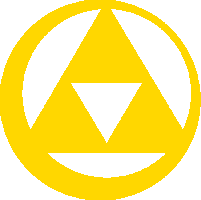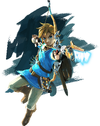Template:GameNav Template:Future game Template:Game The Legend of Zelda: Tri Force Heroes is the eighteenth official Template:LZS game. It is slated to be released for the Nintendo 3DS on October 23, 2015. It was revealed during E3 2015 on June 16.[1][2]
Story
Tri Force Heroes takes place in a fashion-forward land whose name is currently unknown.[3] The land's Princess has been cursed to wear a very bad outfit that she cannot take off.[4] The king is in need of a hero to save her, and sends out a notification asking for heroes to assemble,[3] but there is more than one person claiming to be that hero.[1] A prophecy within the kingdom however, tells of three heroes that come together to form a Totem. The king firmly believes in this legend, and believes that those who meet this criteria are the true heroes.[3]
Gameplay
Tri Force Heroes is similar to the Four Swords games, in which Link is accompanied by two other Links (as opposed to three more in the Four Swords games) as part of the game's Multiplayer. These Links are depicted as green, red, and blue. The game supports download play, local wireless, and online co-op gameplay.[5] During online co-op, players can select the option to play with friends or to be matched with random players from the internet.[6] The game also allows single-player gameplay, in which the other Links are replaced with dolls that the player can switch between during gameplay,[7] similar to the single-player game in Four Swords Adventures.
The game is strongly based off of A Link Between Worlds' aesthetics, including its graphics, enemies, and its use of platforms at different elevations. The Links can climb atop one another to form a Totem that allows them reach higher elevations. The Links must cooperate with each other and coordinate their attacks to solve puzzles, such as one Link throwing a Bomb while the other shoots an Arrow at it. On-screen notifications also appear to inform the other Links of one Link's current state or idea, such as suggesting to form a totem. Several expressions can also be selected from the bottom screen, and can also be used to encourage the other Links or to express an idea or direction. Tapping on a Link's portrait on the touch screen will direct to their position, showing where they are.[4] The three Links share the same Heart Containers, lives (appearing as Fairies), and Rupees. As in A Link Between Worlds, there is also an Energy Gauge that depletes each time an item is used, and gradually recovers. Each Link has his own Energy Gauge.
The game features several dungeons which are structured with four main areas each. Each dungeon contains up to three different items that must be used to progress through them. At the end of each area is a Triforce-shaped portal that teleports the Links to another section. The levels currently known are The Forest, The Temple, The Fortress and The Volcano.[4][8] Players can vote on which stage to go to from the stage selection screen while a timer ticks down. There are also Challenge Courses, in which players play through a more difficult version of the stages with limited items.[5]
The Links can also dress up in multiple different costumes which grant specific abilities. These costumes can be either be purchased or crafted from materials found in dungeons.[1][5][7] Before starting a Stage, each Link must select a Costume to wear.[4] The Hero Tunic is the default costume. The Spin Attack Attire allows Link to perform a stronger Spin Attack. The Lucky Loungewear allows Link a chance to escape from damage. The Big Bomb Outfit allows Link to use and pick up Bombs. The Kokiri Clothes allow Link to shoot three Arrows at once.[4] The Goron Garb allows Link to swim through lava and walk through fire unharmed.[5] The Zelda Dress makes Hearts appear from defeated enemies and grass more frequently.[5]
In addition to the cooperative multiplayer, there is also a VS player mode referred to as the Coliseum. In this mode players battle against each other in timed stages, and can use various items found in these stages. The player who receives the least amount of damage at the end is declared the winner, and is awarded rare materials that can only be obtained from this mode.[9]
Game Information
Development
Game director Hiromasa Shikata explained he wanted to make a multiplayer Zelda game, but wanted to stray away from the competitive nature of the Four Swords games and instead build a game where players would cooperate in a more serious Zelda setting.[1] The idea was initially inspired by the mechanic of switching Link over to Zelda in Spirit Tracks, which Shikata considered a form of multiplayer.[6] Shikata acknowledged the limitations players faced when playing Four Swords and Four Swords Adventures, in that multiple link cables and Game Boy Advances were required to have the full experience. The onset of the 3DS' wireless communication encouraged him to look into building a newer multiplayer game for the handheld.[6]
Eiji Aonuma cited the 3D visuals and depth used in A Link Between Worlds as an inspiration, which he wanted to incorporate into the new game. This inspired the "totem" formation mechanic usable by the Links. Shikata added that a four-player totem was too tall, hence why the Links were reduced to just three.[1]
Costumes were incorporated as a means of powering up the Links and their items, as Shikata wanted to include upgraded abilities similar to the enhanced items in A Link Between Worlds, and felt that costumes would be a natural fit.[5] In an interview with The Verge, Shikata explained that voice chat was once considered for the game, but was dismissed as he felt it would be too stressful for players.[10] Expressive icons were instead added to convey messages and directions.
Timeline Placement
When asked about Tri Force Heroes' place in the Zelda timeline, Shikata stated that it had not yet been decided when the game would take place, as the game could easily take place in any spot in the timeline.[11] However, Julie Gagnon from Nintendo of Canada stated during an interview that the game is not part of the timeline.[12]
Gallery
Artwork
- TFH Three Swords.png
The Links raising their swords
- TFH Totem Artwork.png
The Links forming a Totem while playing
- TFH Stalfos Artwork.png
The Links fighting a giant Stalfos
Video
| Reveal Trailer |
| E3 Nintendo Treehouse Event (Day 1) |
| E3 Nintendo Treehouse Event (Day 2) |
| E3 Nintendo Treehouse Event (Day 3) |
References
- ↑ 1.0 1.1 1.2 1.3 1.4 Nintendo Digital Event @ E3 2015
- ↑ Nintendo 3DS - The Legend of Zelda: Tri Force Heroes E3 2015 Trailer
- ↑ 3.0 3.1 3.2 Template:Cite web
- ↑ 4.0 4.1 4.2 4.3 4.4 Template:Cite web
- ↑ 5.0 5.1 5.2 5.3 5.4 5.5 Nintendo Treehouse Live @ E3 2015 Day 3 The Legend of Zelda: Tri Force Heroes
- ↑ 6.0 6.1 6.2 Template:Cite web
- ↑ 7.0 7.1 Template:Cite web
- ↑ Nintendo Treehouse Live @ E3 2015 Day 1 The Legend of Zelda: Tri Force Heroes
- ↑ Template:Cite web
- ↑ Template:Cite web
- ↑ Template:Cite person
- ↑ Template:Cite person
| Language | Name | Meaning | |
|---|---|---|---|
| Japanese | Template:Japanese | The Legend of Zelda: The Three Triforce Musketeers | |








